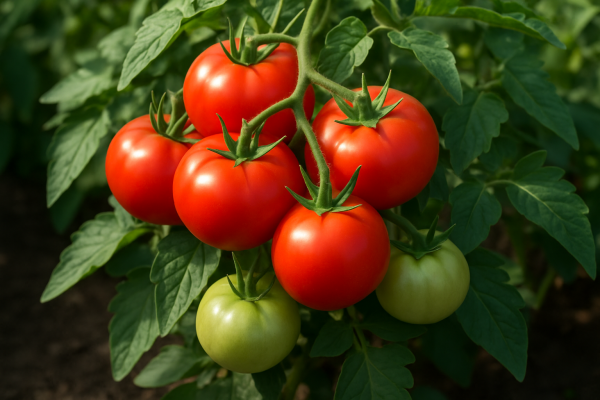
Tomato (Solanum lycopersicum) Datasheet
-
Common Name: Tomato
-
Scientific Name: Solanum lycopersicum
-
Family: Solanaceae
-
Origin: Native to western South America and Central America
-
Zone Hardiness: USDA Zones 10–11; grown as an annual in cooler zones
-
Light Requirements: Full sun; requires 6–8 hours of direct sunlight daily
-
Water Needs: Consistent moisture; deep watering 1–2 times per week, more frequently in containers or during hot weather
-
Soil Preferences: Well-drained loamy soil with a pH of 6.2–6.8
-
"Ponics" Compatibility:
-
Aquaponics: Very compatible
-
Aeroponics: Very compatible
-
Hydroponics: Very compatible
-
Preferred Method: Deep Water Culture (DWC), Nutrient Film Technique (NFT), and Dutch Bucket systems are commonly used for hydroponic tomato cultivation
-
-
Growth Habit: Tender perennial often grown as an annual; growth habit varies by cultivar: determinate (bushy) or indeterminate (vining)
-
Height & Spread: Height: 1.5–2.5 meters; Spread: 0.5–1 meter
-
Time from Germination to Harvest: 65–85 days, depending on variety and growing conditions
-
Flowering Time: Typically blooms in summer; flowers are yellow, star-shaped, and appear in clusters
-
Edible Parts: Fruit is edible; leaves and stems contain tomatine and are generally considered inedible
-
Medicinal Uses: Rich in lycopene, an antioxidant linked to reduced risk of certain cancers and heart disease; traditionally used for treating burns and sunburns
-
Companion Plants: Basil, marigold, asparagus, chives, and nasturtium; these companions can deter pests and improve growth
-
Pest & Disease Resistance: Susceptible to pests like aphids, whiteflies, and hornworms; diseases include blight and wilt. Resistant cultivars are available, denoted by codes such as V (Verticillium), F (Fusarium), N (Nematodes), and T (Tobacco Mosaic Virus)
-
Harvest Time: Harvest when fruits are fully colored and slightly soft to the touch; store at room temperature for best flavor
-
Propagation Methods: Primarily grown from seeds; germination occurs in 7–14 days. Can also be propagated from cuttings
-
Sustainability Features: Tomatoes can be grown in various systems, including hydroponics and aquaponics, allowing for water-efficient cultivation. They can also be part of crop rotation systems to manage soil health
-
Culinary Uses: Consumed raw in salads, cooked in sauces, soups, and stews; also used in juices and dried products
-
Fun Fact: Although botanically a fruit, the U.S. Supreme Court ruled in 1893 that tomatoes are vegetables for tariff purposes
Brandywine (Solanum lycopersicum 'Brandywine')
-
Flavor Profile: Rich, sweet, and slightly tangy; classic "old-fashioned" tomato taste.
-
Culinary Uses: Ideal for slicing, sandwiches, and fresh eating.
-
Notes: Large pink fruits; indeterminate heirloom variety with potato-leaf foliage; late-maturing but highly prized for flavor.
Cherokee Purple (Solanum lycopersicum 'Cherokee Purple')
-
Flavor Profile: Sweet, complex, and slightly smoky.
-
Culinary Uses: Excellent for slicing, salads, and caprese.
-
Notes: Dusky purplish-red fruit with green shoulders; indeterminate heirloom with consistently high flavor ratings.
San Marzano (Solanum lycopersicum 'San Marzano')
-
Flavor Profile: Sweet with low acidity and few seeds.
-
Culinary Uses: Premier choice for sauces, pastes, and canning.
-
Notes: Traditional Italian plum tomato; long, firm fruits; indeterminate and very prolific.
Sun Gold (Solanum lycopersicum 'Sun Gold')
-
Flavor Profile: Exceptionally sweet and fruity.
-
Culinary Uses: Best fresh; perfect for snacking and salads.
-
Notes: Bright orange cherry tomatoes; indeterminate and very productive.
Green Zebra (Solanum lycopersicum 'Green Zebra')
-
Flavor Profile: Tangy, zesty, and slightly tart.
-
Culinary Uses: Great for salads and color contrast in fresh dishes.
-
Notes: Green with yellow stripes; indeterminate heirloom with good disease resistance.
Black Krim (Solanum lycopersicum 'Black Krim')
-
Flavor Profile: Rich, savory, and slightly salty.
-
Culinary Uses: Ideal for slicing and gourmet presentations.
-
Notes: Deep reddish-purple with green shoulders; heirloom from Crimea; thrives in heat.
Early Girl (Solanum lycopersicum 'Early Girl')
-
Flavor Profile: Balanced sweet-acidic tomato flavor.
-
Culinary Uses: Great for salads, sandwiches, and general use.
-
Notes: Early maturing hybrid; determinate and dependable producer.
Roma (Solanum lycopersicum 'Roma')
-
Flavor Profile: Mild, with low moisture and few seeds.
-
Culinary Uses: Ideal for sauces, pastes, and roasting.
-
Notes: Determinate plum tomato with thick flesh; widely grown for preservation.
Yellow Pear (Solanum lycopersicum 'Yellow Pear')
-
Flavor Profile: Mild and subtly sweet.
-
Culinary Uses: Best in salads, pickling, and for visual appeal.
-
Notes: Small, pear-shaped, bright yellow fruits; indeterminate and very prolific.
Mortgage Lifter (Solanum lycopersicum 'Mortgage Lifter')
-
Flavor Profile: Meaty and sweet with minimal seeds.
-
Culinary Uses: Great for slicing and fresh use.
-
Notes: Large pink fruits; heirloom with a backstory of being sold to pay off the breeder’s mortgage.
Juliet (Solanum lycopersicum 'Juliet')
-
Flavor Profile: Sweet, firm, and juicy.
-
Culinary Uses: Great for salads, roasting, and fresh snacking.
-
Notes: Grape tomato hybrid; crack-resistant; highly productive indeterminate.
Costoluto Genovese (Solanum lycopersicum 'Costoluto Genovese')
-
Flavor Profile: Rich, tangy, and old-fashioned.
-
Culinary Uses: Excellent for sauce, slicing, and grilling.
-
Notes: Deeply ribbed Italian heirloom; striking appearance with excellent flavor.
Big Beef (Solanum lycopersicum 'Big Beef')
-
Flavor Profile: Classic beefsteak flavor, balanced and full-bodied.
-
Culinary Uses: Best for sandwiches, burgers, and thick slices.
-
Notes: Hybrid variety with high disease resistance; large red fruits; indeterminate and reliable.
Audio
Video
